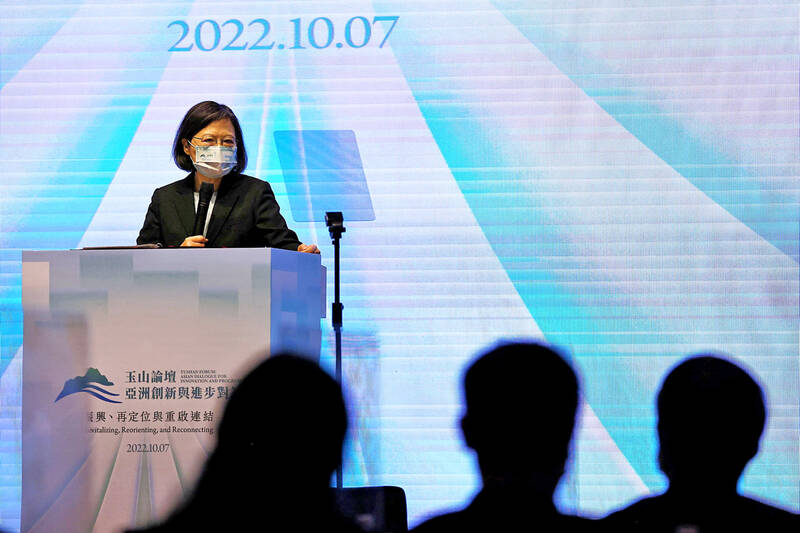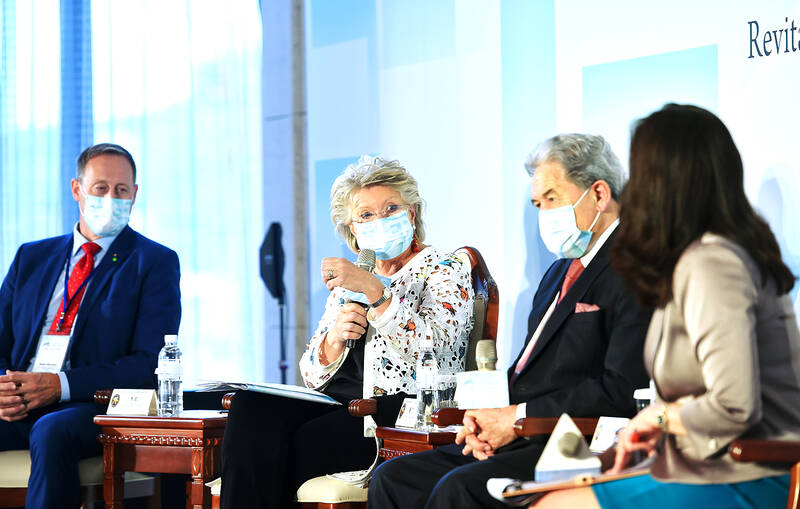Taiwan is looking to play a “crucial” role in the development of the Indo-Pacific region in the post-COVID-19 era, President Tsai Ing-wen (蔡英文) said yesterday at the opening of the two-day Yushan Forum in Taipei.
Taiwan can be “a crucial actor” by assisting in regional and global economic recovery, and contributing to efforts to restructure supply chains, Tsai said.
“While Taiwan stands on the front line of authoritarian expansion, our resilient economy and industrial supply chain remain a vital part of the regional ecosystem,” she said.

Photo: Ann Wang, REUTERS
Tsai pledged to place more emphasis on the government’s New Southbound Policy, an initiative her administration launched in 2016 aimed at expanding economic, cultural and political ties with Southeast Asia, South Asia, Australia and New Zealand.
The policy is to be Taiwan’s “pivotal regional policy for Asia” as it works to “bolster our security and economic ties with partners across the region,” Tsai said.
The government would integrate Taiwan’s capacity in high-tech industries with the policy to promote “a digital New Southbound initiative,” she said.

Photo: Fang Pin-chao, Taipei Times
Taiwan’s enterprises have significantly increased their investment in the 18 countries included in the policy over the past six years, with investment from Taiwan in those countries reaching US$2.2 billion from January to July, Tsai said.
In the first quarter of this year, profits from investments in those 18 countries by listed Taiwanese companies surpassed profits from investment in China by the same companies for the first time, she said.
Former Japanese prime minister Taro Aso said in pre-recorded remarks that he felt a sense of responsibility to further strengthen the relationship between Taiwan and Japan after the passing of former Japanese prime minister Shinzo Abe.
Aso also condemned Russia for “military aggression” against Ukraine, saying that attempts to unilaterally change the “status quo” by force are “not permitted anywhere in the world.”
Japanese lawmaker Keiji Furuya said that like-minded countries should work together to prevent a crisis in the Taiwan Strait, while expressing concern over China’s growing military pressure on Taiwan.
“A contingency in Taiwan means a contingency for Japan and a contingency for countries that share common values of freedom, democracy, the rule of law and basic human rights,” said Furuya, who is chairman of the Japan-ROC Diet Members’ Consultative Council, a 270-member group dedicated to promoting ties between Japan and Taiwan.
Furuya also announced that the second Taiwan-US-Japan strategic forum for lawmakers would be held next month, following the first edition in July last year.
Speaking virtually during a forum luncheon, former Australian minister for foreign affairs Julie Bishop called on all countries to forge closer ties with Taiwan, describing the nation as a force for good and stability in a rapidly changing world.
Bishop, who was her country’s top diplomat from 2013 to 2018, lauded Taiwan for playing an important role in supporting many Pacific nations that have deep ties with Australia, referring to Taiwan’s diplomatic allies in the region: the Marshall Islands, Nauru, Palau and Tuvalu.
“I know there remains great affection and appreciation for the people of Taiwan among those Pacific island nations,” said Bishop, who has been the chancellor of Australian National University since January 2020.
However, with the rise of Chinese influence in many Pacific nations through Beijing’s Belt and Road Initiative, Bishop said there has been a “contest of ideas.”
Bishop said that multilateralism “fails the world,” with Russia and China being permanent members of the UN Security Council, giving them veto rights.
She called on like-minded partners to work in “smaller groupings” to protect common interests.
She proposed that smaller members of the global community such as Taiwan and Australia develop policies to influence other nations and institutions through a supportive multilateral system.
The sixth edition of the Yushan Forum features speeches and panel discussions by former government officials, lawmakers, academics, business leaders and representatives of civic groups from 12 countries, said the event’s organizer, the Taiwan-Asia Exchange Foundation.
Also attending the forum are Rose Gottemoeller, a former NATO deputy secretary-general and US undersecretary of state for arms control and international security, and Palauan President Surangel Whipps Jr, among others.

AIR SUPPORT: The Ministry of National Defense thanked the US for the delivery, adding that it was an indicator of the White House’s commitment to the Taiwan Relations Act Deputy Minister of National Defense Po Horng-huei (柏鴻輝) and Representative to the US Alexander Yui on Friday attended a delivery ceremony for the first of Taiwan’s long-awaited 66 F-16C/D Block 70 jets at a Lockheed Martin Corp factory in Greenville, South Carolina. “We are so proud to be the global home of the F-16 and to support Taiwan’s air defense capabilities,” US Representative William Timmons wrote on X, alongside a photograph of Taiwanese and US officials at the event. The F-16C/D Block 70 jets Taiwan ordered have the same capabilities as aircraft that had been upgraded to F-16Vs. The batch of Lockheed Martin

GRIDLOCK: The National Fire Agency’s Special Search and Rescue team is on standby to travel to the countries to help out with the rescue effort A powerful earthquake rocked Myanmar and neighboring Thailand yesterday, killing at least three people in Bangkok and burying dozens when a high-rise building under construction collapsed. Footage shared on social media from Myanmar’s second-largest city showed widespread destruction, raising fears that many were trapped under the rubble or killed. The magnitude 7.7 earthquake, with an epicenter near Mandalay in Myanmar, struck at midday and was followed by a strong magnitude 6.4 aftershock. The extent of death, injury and destruction — especially in Myanmar, which is embroiled in a civil war and where information is tightly controlled at the best of times —

China's military today said it began joint army, navy and rocket force exercises around Taiwan to "serve as a stern warning and powerful deterrent against Taiwanese independence," calling President William Lai (賴清德) a "parasite." The exercises come after Lai called Beijing a "foreign hostile force" last month. More than 10 Chinese military ships approached close to Taiwan's 24 nautical mile (44.4km) contiguous zone this morning and Taiwan sent its own warships to respond, two senior Taiwanese officials said. Taiwan has not yet detected any live fire by the Chinese military so far, one of the officials said. The drills took place after US Secretary

THUGGISH BEHAVIOR: Encouraging people to report independence supporters is another intimidation tactic that threatens cross-strait peace, the state department said China setting up an online system for reporting “Taiwanese independence” advocates is an “irresponsible and reprehensible” act, a US government spokesperson said on Friday. “China’s call for private individuals to report on alleged ‘persecution or suppression’ by supposed ‘Taiwan independence henchmen and accomplices’ is irresponsible and reprehensible,” an unnamed US Department of State spokesperson told the Central News Agency in an e-mail. The move is part of Beijing’s “intimidation campaign” against Taiwan and its supporters, and is “threatening free speech around the world, destabilizing the Indo-Pacific region, and deliberately eroding the cross-strait status quo,” the spokesperson said. The Chinese Communist Party’s “threats